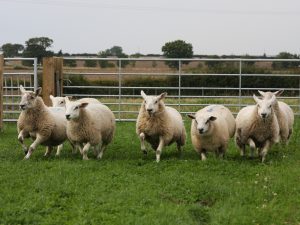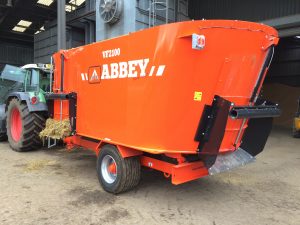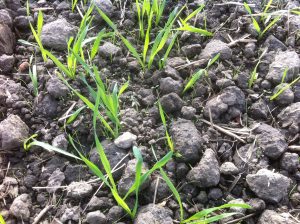Down on the Farm Feb 2017
After the rush of Christmas and New Year it’s been good to get back into more of a routine again. The winter has been pretty kind to us so far – always a bonus when there is no snow. All the talk of polar vortexes and massive chills seemed to pass us by in the North East thankfully.
Work on the farm at this time of year is pretty much dictated by the temperature and how long the days are. If it’s cold enough to freeze the ground we try to get some of the manure taken out to the fields ready for spreading later in the year. There haven’t been many days like this so far although it looks like the end of Jan and start of Feb might get some lower temperatures. If it’s too soft the tractors and heavy trailers just track up the ground too much, causing compaction which hampers growth in the next crop.
We took a chance by planting some wheat fields at the very end of the season in the Autumn – initially they were very slow to come through but they seem to have rallied a bit and hopefully will fill out more as the ground warms up. I think Paul is keen to get the seed in a couple of weeks earlier next time to save the stress of waiting to see if they are ever going to come up.

The ewes have been getting plenty of supplementary feeding to keep them in good condition during their pregnancy. They are all still outside but they do have access to come into some covered areas if the weather gets too bad. So far, virtually all the ewes have held in lamb and they are looking good. We will start to monitor them more closely as pregnancy progresses to spot any which need extra feed or attention. It’s always time well spent as lambing goes so much better when you have a strong healthy ewe with plenty of milk and two good strong lambs. Hopefully by the end of March, we will have some good fresh grass to get the new lambs onto. We planted some new grass leys last year which should be coming good this spring and summer, although we need to be careful not to overgraze them in the first season.
The store lambs we still have that were born last year don’t really grow much more at this time of the year – it’s a matter of managing their feeding so that we have a steady flow of correctly finished lambs available for the farm shop. The crossbred lambs we now have (North Country Mule X Beltex) are better at maintaining condition longer than the Suffolk crossbreeds we used to have
All the cattle are still indoors so it’s very much the normal feeding and bedding routine for our farm staff. In between they try to do any repairs and maintenance while things are quiet. The new cattle feeder is working well – it chops and mixes the silage, barley and soya with a huge pair of contra rotating blades and paddles, then chucks it out the side into the feed troughs. It means one person can safely feed 400 cattle in a morning, pretty much without having to get off the machines. It also gives them plenty of opportunity to have a good check of the cattle every morning as they come forward to the troughs.

The sheds are pretty well stocked this winter so we are getting well through the silage we made last summer – when it’s decent quality the cattle just simply eat more so they are the best judge of how well we have done. We are currently sending regular loads of cattle up into Scotland where they pay a premium for the Aberdeen Angus crosses we have. Only about 10% of our beef cattle are selected for the shop, the rest go to other butchers and general food trade. That means that we can choose the very best for ourselves – lighter heifers with just the right amount of condition so that we can hang them well for taste and texture.
This year coming should prove to be an interesting one for farmers (as well as everyone else) as the Brexit process goes forwards. At the moment it’s still very unclear how the agricultural support system will be changed – for sure we think it will include more moves towards environmental schemes and sustainable land management. Northumberland still has many of the traditional mixed farms, especially in the hill areas so we hope they will still be properly supported to help maintain the epic countryside we have in these parts.

